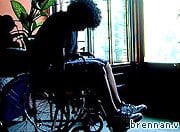A proposal to allow disabled people in Scotland to seek assistance to end their lives is set to be dropped following pressure from disability campaigners.
Bill Scott, Policy Officer at the campaign group Inclusion Scotland, welcomed the decision, saying: “That clause was dangerous, particularly at a time of cutbacks, to say to people you can’t live independently but you can apply for state-assisted suicide as if it’s a way out.
“We would welcome the decision to drop this clause but we still oppose any change to the law.”
Ending
The End of Life Assistance (Scotland) Bill, proposed by Independent MSP Margo MacDonald, would still allow the terminally ill to seek assistance in ending their lives if it became law.
But Mrs MacDonald has agreed to ditch the clause which said that a person would be eligible for an assisted suicide if they were “permanently physically incapacitated to such an extent as not to be able to live independently and finds life intolerable”.
Earlier this year Baroness Campbell of Surbiton, who is herself disabled, warned Westminster politicians that disabled people need help and support to live, not help to die.
She said: “We cannot allow others to speak for us – especially those who seek to offer us the choice of a premature death: it is not a choice, it is to abandon us.”
Inevitably
Mrs MacDonald is also considering increasing the age at which terminally ill people can seek assistance in ending their lives from 16 to 18.
She defended the Bill, saying: “I had hoped that people would have been reassured by the evidence that a change in the law in the Netherlands, Switzerland and Belgium has not led to a slippery slope.
“However, I don’t want anyone to be upset and if we haven’t found the best possible words people have been frightened by what was proposed then I want to change the bill to make our intentions clearer.”
But earlier this week Dr Tony Calland, Chair of the British Medical Association’s Medical Ethics Committee, cautioned that any legalisation of assisted suicide would inevitably lead an increasing number of cases.
Children
Dr Calland illustrated his case by pointing to the Netherlands where legislation was originally introduced to deal with just the terminally ill, and he warned that it has now grown to include people who are seriously ill and some children who are severely disabled.
The Bill, which is currently being scrutinised by a Holyrood committee, has been plagued by opposition.
Betray
In July a leading doctor warned that legalising assisted suicide would betray “Scottish values” for the benefit of a vocal few.
Dr Rosemary Barrett, Director of the Scottish Council on Human Bioethics, said: “The Bill is designed for people who believe their existence is ‘intolerable’. However, the truth is that Scotland offers excellent care for people suffering from extraordinary pain.
“Our palliative care services are capable of more than adequately managing physical pain. With such advanced medical services available, no person needs to experience ‘intolerable’ pain.”
Attacked
And in April, 16 palliative care specialists attacked the Bill in an open letter to The Times newspaper.
In the letter the medics warned that the Bill “sends a message to all disabled people and terminally ill patients that somehow because they are dependent on others they are of less value to our society and so may feel that they ought to choose to bring forward the time of their death.”

